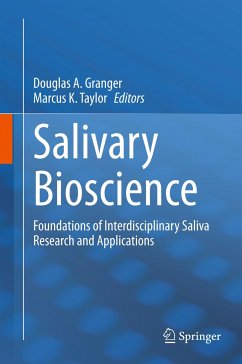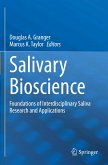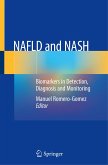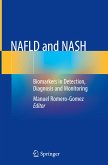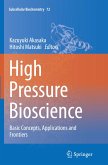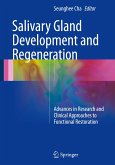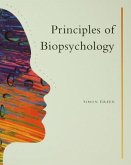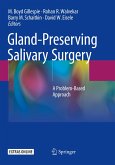Salivary Bioscience
Foundations of Interdisciplinary Saliva Research and Applications
Herausgegeben:Granger, Douglas A.; Taylor, Marcus K.
Salivary Bioscience
Foundations of Interdisciplinary Saliva Research and Applications
Herausgegeben:Granger, Douglas A.; Taylor, Marcus K.
- Gebundenes Buch
- Merkliste
- Auf die Merkliste
- Bewerten Bewerten
- Teilen
- Produkt teilen
- Produkterinnerung
- Produkterinnerung
This book provides the first comprehensive overview of the emerging field of interdisciplinary salivary bioscience. It serves as a foundational reference guide to the collection, analysis, and interpretation of salivary data, as well as its myriad applications in medicine, surveillance and public health. The ease and non-invasive nature of saliva collection makes it highly useful in diverse fields such as pediatrics, dentistry, neuroscience, psychology, animal welfare and precision medicine. This book introduces students and scientists alike to the vast potential of salivary bioscience in both research and practice.…mehr
![Salivary Bioscience Salivary Bioscience]() Salivary Bioscience133,99 €
Salivary Bioscience133,99 €![NAFLD and NASH NAFLD and NASH]() NAFLD and NASH90,94 €
NAFLD and NASH90,94 €![NAFLD and NASH NAFLD and NASH]() NAFLD and NASH88,99 €
NAFLD and NASH88,99 €![High Pressure Bioscience High Pressure Bioscience]() High Pressure Bioscience147,99 €
High Pressure Bioscience147,99 €![Salivary Gland Development and Regeneration Salivary Gland Development and Regeneration]() Salivary Gland Development and Regeneration103,99 €
Salivary Gland Development and Regeneration103,99 €![Principles of Biopsychology Principles of Biopsychology]() Simon GreenePrinciples of Biopsychology180,99 €
Simon GreenePrinciples of Biopsychology180,99 €![Gland-Preserving Salivary Surgery Gland-Preserving Salivary Surgery]() Gland-Preserving Salivary Surgery81,99 €
Gland-Preserving Salivary Surgery81,99 €-
-
-
- Produktdetails
- Verlag: Springer / Springer International Publishing / Springer, Berlin
- Artikelnr. des Verlages: 978-3-030-35783-2
- 1st ed. 2020
- Seitenzahl: 768
- Erscheinungstermin: 8. April 2020
- Englisch
- Abmessung: 241mm x 160mm x 47mm
- Gewicht: 1228g
- ISBN-13: 9783030357832
- ISBN-10: 303035783X
- Artikelnr.: 57932713
- Verlag: Springer / Springer International Publishing / Springer, Berlin
- Artikelnr. des Verlages: 978-3-030-35783-2
- 1st ed. 2020
- Seitenzahl: 768
- Erscheinungstermin: 8. April 2020
- Englisch
- Abmessung: 241mm x 160mm x 47mm
- Gewicht: 1228g
- ISBN-13: 9783030357832
- ISBN-10: 303035783X
- Artikelnr.: 57932713
1.1 Foundations of Interdisciplinary Salivary Bioscience: An Introduction (Granger et al.)
1.2 Salivary Gland Anatomy and Physiology (Hernández et al.)
1.3 Saliva Collection, Handing, Transport, and Storage: Special Considerations and Best Practices for Interdisciplinary Salivary Bioscience(Padilla et al.)
1.4 Analytical Strategies and Tactics in Salivary Bioscience (Riis et al.)
Part 2 Physiology and Development Research and Applications
(Part 2 Editor: Dr. Jenna Riis)
2.1 Salivary Bioscience, Human Stress, and the Hypothalamic Pituitary Adrenal Axis
(Clow et al.)
2.2 The Use of Saliva for Genetics and Epigenetics Research (Nemoda et al.)
2.3 Saliva as a Window Into the Human Oral Microbiome and Metabolome(Whiteson et al.)
2.4 Salivaomics, saliva Exo-somics, and Saliva Liquid Biopsy (Wong et al.)
2.5 Salivary Bioscience, Immunity, and Inflammation (Riis et al.)
2.6 Salivary Bioscience and Human Development (Hibel et al.)
Part 3 Biomedical Research and Related Applications
(Part 3 Editor: Dr. Elizabeth Thomas)
3.1 Biomedical Research and Related Applications:Current Assay Methods and Quality Requirements in Oral Fluid Diagnostics Applications (Granger S. et al.)
3.2 Salivary Biomarkers and Neurodegenerative Conditions (Thomas et al.)
3.3 The Use of Antibodies in Saliva to Measure PathogenExposure and Infection(Heaney et al.)
3.4 Salivary Bioscience and Pain (Payne et al.)
3.6 Salivary Bioscience and Environmental Exposure Assessment (Panuwet et al.)
3.7 Saliva and Drugs of Abuse (Navazesh et al.)
3.8 Therapeutic Drug Monitoring in Saliva (Thomas)
3.9 Salivary Bioscience and Periodontal Medicine (Freire et al.)
3.10 Salivary Bioscience and Cancer (Navazesh et al.)
Part 4 Psychosocial Research and Applications(Part 4 Editor: Dr. Kate Ryan Kuhlman)
4.1 Salivary Bioscience in Clinical Psychologyand Psychiatry(Kuhlman)
4.2 Salivary Bioscience Research in Health Psychology and Behavioral Medicine
(Hoyt et al.)
4.3 The Neuroscience of Human Social Behavior: A Review of How Testosterone and Cortisol Underpin Competition and Affiliation Dynamics (Kornienko et al.)
4.4 Salivary Studies of the Social Neuroscience of Human-animal Interaction (Pendry et al.)
Part 5 Population Health Research and Applications(Part 5 Editor: Dr. Marcus Taylor)
5.1 Salivary Bioscience and Military, Space, and OperationalResearch(Roma et al.)
5.2 Salivary Bioscience Research Related to Prenatal Adversity (Eiden et al.)
5.3 Salivary Bioscience and Pediatrics (Johnson et al.)
5.4 Use of saliva to better understand the experience of adulthood and aging(Almeida et al.)
5.5 Salivary Bioscience and Research on Animal Welfare and Conservation Science(Staley et al.)
Part 6 The Way Forward: Future Directions for the Science and Practice of Salivary Bioscience
6.1 Applications of Salivary Bioscience to Precision Medicine (Kuhlman)
6.2 Public Health and IndustryApplications of Salivary Bioscience (Riis et al.)
6.3Envisioning the Future of Interdisciplinary Salivary Bioscience (Granger et al.)
1.1 Foundations of Interdisciplinary Salivary Bioscience: An Introduction (Granger et al.)
1.2 Salivary Gland Anatomy and Physiology (Hernández et al.)
1.3 Saliva Collection, Handing, Transport, and Storage: Special Considerations and Best Practices for Interdisciplinary Salivary Bioscience(Padilla et al.)
1.4 Analytical Strategies and Tactics in Salivary Bioscience (Riis et al.)
Part 2 Physiology and Development Research and Applications
(Part 2 Editor: Dr. Jenna Riis)
2.1 Salivary Bioscience, Human Stress, and the Hypothalamic Pituitary Adrenal Axis
(Clow et al.)
2.2 The Use of Saliva for Genetics and Epigenetics Research (Nemoda et al.)
2.3 Saliva as a Window Into the Human Oral Microbiome and Metabolome(Whiteson et al.)
2.4 Salivaomics, saliva Exo-somics, and Saliva Liquid Biopsy (Wong et al.)
2.5 Salivary Bioscience, Immunity, and Inflammation (Riis et al.)
2.6 Salivary Bioscience and Human Development (Hibel et al.)
Part 3 Biomedical Research and Related Applications
(Part 3 Editor: Dr. Elizabeth Thomas)
3.1 Biomedical Research and Related Applications:Current Assay Methods and Quality Requirements in Oral Fluid Diagnostics Applications (Granger S. et al.)
3.2 Salivary Biomarkers and Neurodegenerative Conditions (Thomas et al.)
3.3 The Use of Antibodies in Saliva to Measure PathogenExposure and Infection(Heaney et al.)
3.4 Salivary Bioscience and Pain (Payne et al.)
3.6 Salivary Bioscience and Environmental Exposure Assessment (Panuwet et al.)
3.7 Saliva and Drugs of Abuse (Navazesh et al.)
3.8 Therapeutic Drug Monitoring in Saliva (Thomas)
3.9 Salivary Bioscience and Periodontal Medicine (Freire et al.)
3.10 Salivary Bioscience and Cancer (Navazesh et al.)
Part 4 Psychosocial Research and Applications(Part 4 Editor: Dr. Kate Ryan Kuhlman)
4.1 Salivary Bioscience in Clinical Psychologyand Psychiatry(Kuhlman)
4.2 Salivary Bioscience Research in Health Psychology and Behavioral Medicine
(Hoyt et al.)
4.3 The Neuroscience of Human Social Behavior: A Review of How Testosterone and Cortisol Underpin Competition and Affiliation Dynamics (Kornienko et al.)
4.4 Salivary Studies of the Social Neuroscience of Human-animal Interaction (Pendry et al.)
Part 5 Population Health Research and Applications(Part 5 Editor: Dr. Marcus Taylor)
5.1 Salivary Bioscience and Military, Space, and OperationalResearch(Roma et al.)
5.2 Salivary Bioscience Research Related to Prenatal Adversity (Eiden et al.)
5.3 Salivary Bioscience and Pediatrics (Johnson et al.)
5.4 Use of saliva to better understand the experience of adulthood and aging(Almeida et al.)
5.5 Salivary Bioscience and Research on Animal Welfare and Conservation Science(Staley et al.)
Part 6 The Way Forward: Future Directions for the Science and Practice of Salivary Bioscience
6.1 Applications of Salivary Bioscience to Precision Medicine (Kuhlman)
6.2 Public Health and IndustryApplications of Salivary Bioscience (Riis et al.)
6.3Envisioning the Future of Interdisciplinary Salivary Bioscience (Granger et al.)

